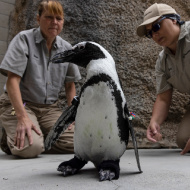
San Diego Zoo resident Lucas can now walk with ease.
A penguin with a degenerative foot condition has been given a new lease of life after receiving custom-made orthopaedic shoes.
Lucas, who lives at San Diego Zoo in the African penguin colony, has bumblefoot. Bumblefoot is an umbrella term used to describe a range of degenerative foot conditions in birds.
This can range from mild redness to deep abscesses and can lead to sepsis and death by secondary infection if left untreated. In Lucas's case, it is believed to be a permanent condition.
Lucas developed bumblefoot when a spinal infection left him with weak leg muscles. As he could not stand upright on his toes, he was forced to rest on his ankles, forming sores on his feet and legs.
Wildlife health and care teams at the zoo collaborated with Thera-Paw to design, create and fit custom orthopaedic shoes for Lucas, in order to prevent the development of pressure sores.
Dr Beth Bicknese, senior veterinary surgeon at the San Diego Zoo, said: “I’ve known Lucas for a long time, so having the ability to provide him with a chance to live a normal life brings a smile to my face.
“The boots are cushioned and Velcroed in place, so they will help Lucas to fully participate in the colony and showcase behaviors that are more typical for a penguin—such as climbing the rocks, swimming, nesting and finding a suitable mate.”
After being fitted with the custom shoes, Lucas is doing well. Wildlife care specialists at the zoo have noticed that his posture has become more natural, and his ability to navigate the penguin's rocky zoo habitat.
Senior wildlife care specialist Debbie Denton commented: “We were pleasantly surprised at the immediate change in Lucas after we fitted him with his new boots.
“Seeing him move about now gives us hope that he may be OK going forward, and able to live a full life.”
Image (C) San Diego Zoo



 Zoetis has launched a new survey to identify management techniques for Equine Herpes Virus (EHV).
Zoetis has launched a new survey to identify management techniques for Equine Herpes Virus (EHV).